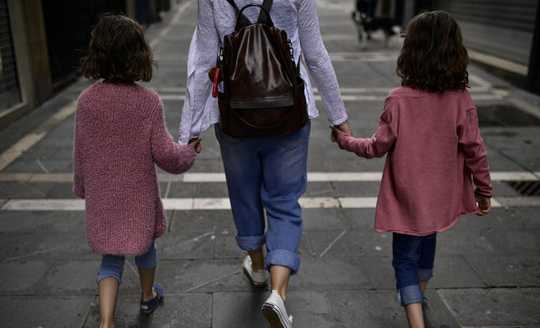 A family go for a hand-in-hand walk along a street of the old city, in Pamplona, northern Spain, April 27, 2020, as some social distancing rules are relaxing after weeks of quarantine. (AP Photo/Alvaro Barrientos)
A family go for a hand-in-hand walk along a street of the old city, in Pamplona, northern Spain, April 27, 2020, as some social distancing rules are relaxing after weeks of quarantine. (AP Photo/Alvaro Barrientos)
The world is upside down right now due to coronavirus. Although there are early signs of tentative re-openings for trial-and-error life after quarantine, we cannot — and arguably should not — downplay the ongoing challenges and uncertainties for our children. Some have contended that talking to children about the COVID-19 outbreak is an opportunity to build resiliency.
Psychologists commonly explain resilience as “how well a person can adapt to events in their lives … when faced with a tragedy, natural disaster, health concern, relationship, work or school problem.”
If we want our children and youth to emerge from this world emergency as more resilient, we need to understand that resilience is not the inevitable outcome of exposure to hardship. After all, we probably all know people who thrive under difficult conditions and others who sink under the weight of adversity.
So what can we do to tip the scales in favour of resilience?
Caring, sensitive responses
Parents can help by creating conditions to build resilience at home. Young people tend to be more resilient to life challenges when they feel loved, cared for and supported. Now, more than ever, young people need to experience their family as caring, sensitive and responsive to their needs.
We can convey this in words, but here are four concrete actions and approaches parents can focus on to communicate a feeling that things are under control.
1. Strive for a consistent home environment
In particular, in this period of constant change, children and youth benefit when we structure our home environment to be organized, consistent, fair and predictable.
Physical spaces that are clean and organized convey a sense of order and calm. Daily routines give children a sense of stability and predictability. Consistent rules help bring structure to children’s lives and combat the sense of disruption and chaos surrounding so many of us.
Organization need not extend to the entire house. It may be enough to focus on keeping eating and sleeping places clean and tidy. Routines can also be as simple as a set time for school work, a short walk after dinner each day or family movie night every Friday. Rules can also be specific to this time period, and they work best if there are clear and obvious benefits to everyone.
 It may be enough to focus on keeping sleeping places clean and tidy. (Shutterstock)
It may be enough to focus on keeping sleeping places clean and tidy. (Shutterstock)
2. Focus on what’s going right
Parents can also deliberately model and foster habits connected to resiliency.
Positivity is an especially important factor that contributes to resilience after disasters. Positivity doesn’t mean burying your head in the sand and pretending all is well in the world. Rather, it means having a balanced and accurate understanding of the world and making a deliberate effort to focus on things that are going right.
It means reminding ourselves that if there is an absence of eggs at the grocery store, chickens will lay more eggs tomorrow. It means deliberately seeking out and sharing good news stories. Sharing and modelling positivity for our children helps them learn this habit, and will benefit our mental health as well.
3. Model belief in your own abilities
A strong sense of self-efficacy is another important factor related to resilience. Self-efficacy refers to the belief that we have in our own abilities, especially our ability to succeed when challenged. We can help young people develop a strong sense of self-efficacy for coping with the current crisis by supporting their efforts to take on new challenges and succeed.
Perhaps you can encourage your child to teach their grandparents how to communicate via video chat. Or celebrate your teenager who figures out how to get pizza delivered to your house without breaking the two-metre social distancing rule.
Young people also develop a sense of self-efficacy for coping by watching you do the same. If the shortage of bread options at the grocery store motivates you to master the art of baking bread, this is a great opportunity to tackle this task. And don’t worry if it turns out harder than a cement block. Children benefit from watching adults who fail but learn from their mistakes and keep on trying.
 A tried and true wellness strategy: focus on nutrition. (Markus Spiske/Unsplash), CC BY
A tried and true wellness strategy: focus on nutrition. (Markus Spiske/Unsplash), CC BY
4. Remember to take care of yourself
If implementing these strategies seems overwhelming, children and youth benefit when we use any of them, so parents can make a difference by choosing any one approach that seems manageable and appealing. Whatever parents decide, we are more likely to succeed with strategies that also benefit our own sense of well-being.
And finally, it may be most helpful to remember that children do better when their parents are doing well. Under these extraordinarily stressful conditions, it is more important than ever that we make time for our own tried-and-true mental wellness strategies, be it paying attention to nutrition, going outside every day, turning cell phones off in the bedroom, reaching out to a friend or connecting with a mental health professional.
After all, we have all been taught on airplanes to put on our own oxygen mask first in the event of an emergency — otherwise, we are in no position to help others. And I believe we can rightly call this an emergency.![]()
About The Author
Carolyn FitzGerald, Assistant Professor, Faculty of Education, Wilfrid Laurier University
This article is republished from The Conversation under a Creative Commons license. Read the original article.
books_family






















